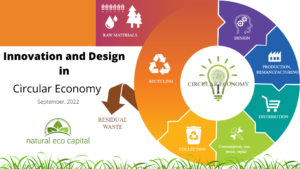
The circular economy is growing and gaining traction. This is because businesses and governments need to adapt to the increasing price volatility, the costs for virgin materials, energy, and waste disposal with the attendant disruptive technologies, and growing stringent environmental expectations by regulators, investors, and the larger society in order to address climate change and other socio-environmental challenges.
Circular Economy, as a strategy addresses these challenges, manages risk, and builds stronger more resilient, and competitive businesses and economies.
But how can businesses, governments, and individuals understand what Circular Economy can change and deliver? How can organizations unlock wealth in idle and/or under-utilized value in assets and thus improve resource security and future-proof business for the relevant sectors and stakeholders?
These form the basis for this Two Day ONLINE introductory course on Innovation and Design in Circular Economy planned by Natural Eco Capital.